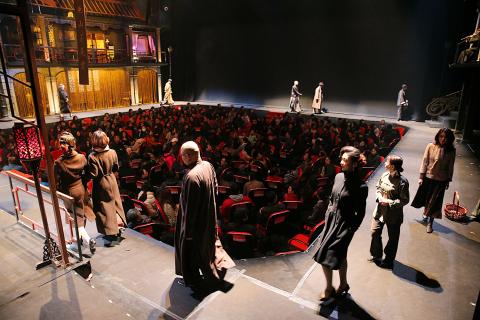Stan Lai’s (賴聲川) widely acclaimed A Dream Like A Dream (如夢之夢), a major landmark in Chinese-language theater, will take the stage at Taipei’s National Theater from Aug. 19 to Sept. 1.
First staged in Taiwan and Hong Kong in 2002, the epic eight-hour production has returned with a new cast, and features actors Chin Shih-chieh (金士傑), Hsu Yen-ling (徐堰鈴), Hu Ge (胡歌) and Chinese pop star Chris Lee (李宇春). Thirty actors will portray over 100 roles in the show. Oscar-winning designer Tim Yip (葉錦添) created the design for the 300-plus costumes.
Epic, romantic, extravagant, metaphysical and engrossing, Lai’s masterpiece will run for a total of eight shows. The production will have no subtitles.

Photo courtesy of Performance Workshop theater
“This story is about life and people’s choices,” Lai told the Taipei Times in an interview in June. “It’s essentially about karma.”
The plotline tells several interwoven stories with one leading to another. The narrative follows the life of Gu Shiang-lan, who lived through much of the 20th century, first as a prostitute in 1930s Shanghai and then, after marrying an aristocrat, a painter in Paris. Following the death of her husband, she returns to China in the 1950s and experiences the Cultural Revolution.
Lai said he drew on the Tibetan Book of the Dead, Tiananmen Square massacre and the Cultural Revolution to craft the emotionally complex story.
“The story moves ahead in time while referring to the past constantly, thus forming a unified whole,” Lai said.
To best present this complex story about love, life and enlightenment, Lai conceived a daunting 360-degree, two-story circular stage that surrounds the audience, who sit in the center pool section. Actors perform on the circular stage, sometimes with two or three actors for the same role appearing simultaneously.
“This story came to me organically, “ Lai said, adding that he thought up the story while attending a seminar in India in 1999. During a meditation session in front of the lotus tree where the Buddha is said to have attained enlightenment, the inspiration surged into Lai’s mind and he quickly scribbled down the plotline. “When you fall into the spell of this show, you won’t feel the length at all,” Lai said of the play’s length.
The performance is divided into two parts and scheduling allows audience members to watch it on two consecutive nights or both parts at the same time.

On April 26, The Lancet published a letter from two doctors at Taichung-based China Medical University Hospital (CMUH) warning that “Taiwan’s Health Care System is on the Brink of Collapse.” The authors said that “Years of policy inaction and mismanagement of resources have led to the National Health Insurance system operating under unsustainable conditions.” The pushback was immediate. Errors in the paper were quickly identified and publicized, to discredit the authors (the hospital apologized). CNA reported that CMUH said the letter described Taiwan in 2021 as having 62 nurses per 10,000 people, when the correct number was 78 nurses per 10,000

As we live longer, our risk of cognitive impairment is increasing. How can we delay the onset of symptoms? Do we have to give up every indulgence or can small changes make a difference? We asked neurologists for tips on how to keep our brains healthy for life. TAKE CARE OF YOUR HEALTH “All of the sensible things that apply to bodily health apply to brain health,” says Suzanne O’Sullivan, a consultant in neurology at the National Hospital for Neurology and Neurosurgery in London, and the author of The Age of Diagnosis. “When you’re 20, you can get away with absolute

May 5 to May 11 What started out as friction between Taiwanese students at Taichung First High School and a Japanese head cook escalated dramatically over the first two weeks of May 1927. It began on April 30 when the cook’s wife knew that lotus starch used in that night’s dinner had rat feces in it, but failed to inform staff until the meal was already prepared. The students believed that her silence was intentional, and filed a complaint. The school’s Japanese administrators sided with the cook’s family, dismissing the students as troublemakers and clamping down on their freedoms — with

As Donald Trump’s executive order in March led to the shuttering of Voice of America (VOA) — the global broadcaster whose roots date back to the fight against Nazi propaganda — he quickly attracted support from figures not used to aligning themselves with any US administration. Trump had ordered the US Agency for Global Media, the federal agency that funds VOA and other groups promoting independent journalism overseas, to be “eliminated to the maximum extent consistent with applicable law.” The decision suddenly halted programming in 49 languages to more than 425 million people. In Moscow, Margarita Simonyan, the hardline editor-in-chief of the